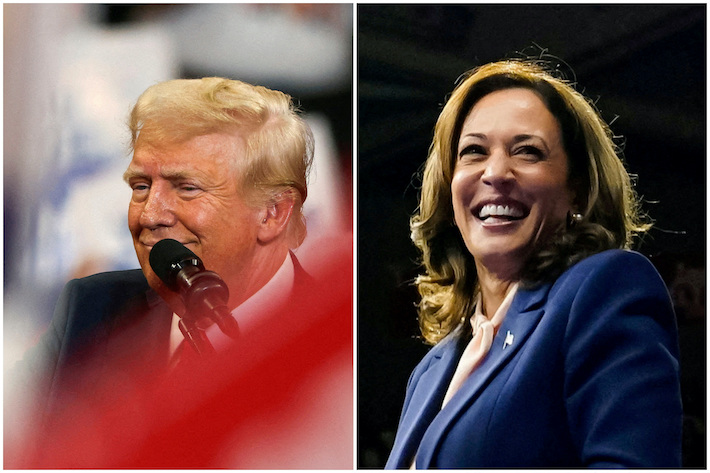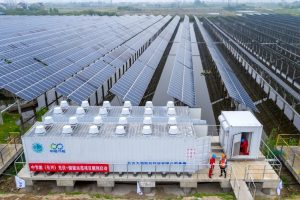Analysts expect the intense technological rivalry between US and China to continue no matter who wins the presidential election on November 5.
Republican former president Donald Trump or Vice President Kamala Harris are reportedly neck and neck in the polls currently, and while Trump has given blunt warnings that he will impose tougher tariffs on Chinese exports, the Democrat candidate is also seen as likely to continue the Biden approach of imposing targeted rules against Beijing.
New efforts to slow the flow of less-sophisticated Chinese chips, smart cars and other imports into the US are expected, alongside more curbs on chipmaking tools and highly-prized AI chips headed to China, according to former officials from the Biden and Trump administrations, industry experts and people close to the campaigns, Reuters said.
ALSO SEE: Yuan Suffers Biggest Dip in a Year, Amid Fear of Trump Poll Win
In her bid for the presidency, Harris has said she will make sure “America, not China, wins the competition for the 21st century,” while Trump has pitched ever-increasing tariffs as a cure-all that includes combating Chinese technological advancement.
In short, the battle to keep US money and technology from boosting China’s military and artificial intelligence capabilities is bound to escalate under either Harris or Trump.
“We’re seeing the opening of a new front on the US-China tech cold war that is focused on data, software and connected devices,” Peter Harrell, a former national security official in the Biden administration, said.
Last month, the US proposed rules to keep connected cars made with Chinese components off America’s streets, while a law was passed this spring that said the short video app TikTok must be sold by its Chinese parent by next year or be banned.
“There’s a lot of concern if a Chinese company is able to access and provide updates to devices,” Harrell said. “The connected car thing and TikTok are just the tip of the iceberg.”
Trump seen as being more aggressive
Should Harris win the election, her approach would likely be more targeted and coordinated than Trump’s, people close to both administrations say.
For example, she is likely to continue working with allies much like the Biden administration has, to keep US tech from aiding the Chinese military, Harrell said.
A Trump administration, on the other hand, may move more quickly, and be more willing to punish recalcitrant allies.
“I think we learned from President Trump’s first term that he has a bias for action,” said Jamieson Greer, former chief of staff to Robert Lighthizer, the US trade representative under Trump who remains close to the campaign.
Nazak Nikakhtar, a Commerce Department official under Trump who knows his current advisers, expects a Trump administration to be “much more aggressive about export control policies towards China.”
She anticipates “a significant expansion of the entity list,” to capture affiliates and business partners of listed companies. The list restricts exports to those on it. Trump added China’s Huawei Technologies to the list for sanctions busting.
Licences to ship US technology to China also are more likely to be denied, Nikakhtar said.
She said she would not be surprised if a Trump administration imposed restrictions not only on imports of Chinese chips but on “certain products containing those chips.”
And she expects Trump to be tougher than Harris on allies who don’t follow the US lead. “The Trump philosophy is more of a stick,” she said.
‘Sledgehammer vs scalpel’
Bill Reinsch, a former Commerce official during the Clinton administration sees Trump as likely to take a “sledgehammer” to controls where Harris would use a “scalpel.”
“Trump’s approach has been across-the-board, most clearly seen in his current tariff proposals,” Reinsch said.
Trump has said he would impose tariffs of 10 or 20% on all imports (not just Chinese) and 60% or more on Chinese imports.
Harris has described Trump’s tariff plan as a tax on consumers, but the Biden administration has seen the need for targeted tariffs including increasing the rate on semiconductors from 25 to 50% by 2025.
China has repeatedly said it would safeguard its rights and interests. Last year, it targeted US memory chipmaker Micron Technology after Washington imposed a series of export controls on US chips and chipmaking equipment, and the US accused Beijing of penalizing other US companies amid growing tensions.
China also introduced export restrictions last year on germanium and gallium, metals widely used in chipmaking, citing national security interests.
It issued new curbs on some graphite products that go into electric vehicle batteries in October 2023, days after the US tightened rules on chip-related exports. And in June it unveiled new rules on rare earth elements critical for military equipment and consumer electronics.
Wilbur Ross, commerce secretary under Trump, said that the US needs to be tough on China, but strategic, too, noting the US is still dependent on China for rare earths.
“It would be very dangerous to just try to cut them off,” he said.
- Reuters with additional editing by Jim Pollard
ALSO SEE:
TSMC Ends Dealings With Firm Seen as Proxy Buyer For Huawei
TikTok Set For Day in Court to Fight Potential US Ban
China’s Critical Minerals Blockade Risks Global Chip Shortage
Many US Manufacturers Don’t Want Tariff Hikes on China Imports
China to Curb Exports of Antimony Metals, Ores, Oxides – SCMP
US Forced To Delay Tariff Hikes on Chinese EVs, Batteries, Tech
US Tech Firms Face ‘Death Spiral’ From New China Curbs: Lawmakers
Double or Quadruple, Biden Tariffs Won’t Really Hurt China
Trade War Heating Up: China Hits Back After Biden Boosts Tariffs
Chinese Firms Seen Shifting Production Abroad to Avoid US Tariffs






















